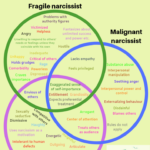Narcissism facts.
Reliable narcissism facts are difficult to find these days, because not much research has been done on narcissistic personality disorder. Another reason why reliable narcissism facts are difficult to find is because many websites copy paste information from other websites without checking their sources. So I’ve searched for proper scientific articles and made this page for you guys. In the next paragraph you find the most important narcissism facts summarized.
The narcissism facts on this page are based on a American study among more than 34.000 individuals. The results show that more men than women have Narcissistic personality disorder. Also more Afro-American than Caucasian people have narcissism. This suggests that cultural influences play a huge role in the development of narcissism. In some cultures the individual is more important than the collective. This suggests that people in these cultures are raised believing that they are more special, unique, that others envy them and they envy others more often, behave more arrogant and are more preoccupied with fantasies about success than people from different cultures.
For more information:
- What is narcissism?
- NPD symptoms.
- NPD test.
- How to live with a narcissistic person?
- How to deal with a narcissistic parent?
- Having a narcissistic mother-in-law.
- Online treatment for narcissism or guidance for those living with a narcissist.
- Take me to the homepage.
At Barends Psychology Practice, narcissistic personality disorder treatment is offered. Contact us to schedule a first, free of charge, appointment. (Depending on your health insurance, treatment may be reimbursed)
Narcissism facts – prevalence
- 6.2% of the people have narcissism. 7.7% of the men and 4.8% of the women [1].
- More young adults (20-34) than older adults (50+) have narcissism: 8.9% versus 4.4% [1].
- Narcissism is more common among Afro-Americans (12,5%) compared to Hispanics (7.5%) and Caucasians (5.0%) [1].
- There are more single (9.6%), divorced/separated (7.3%) narcissists than married ones (4.9%) [1].
(Advertisement. For more information, please scroll down.)
Narcissism facts – signs and symptoms
- Most narcissists think they are unique or special (82.1%), followed by having a sense of entitlement (80.4%), and showing a lack of empathy (78.8%).
- Men score higher than women on a lack of empathy (83.1% vs. 72.3%) [1].
- Men also score higher than women on having a sense of entitlement (82.6% vs. 77.1%), and interpersonal exploitativeness (65.5% vs. 55.7%) [1].
- Women score higher than men on Envying others/believing that others envy them (78.4% vs. 72.6%) [1].
- Also women more often than men score higher on Arrogant or haughty demeanor (42.0% vs. 35.7%) [1].
- More young adults compared to older adults are preoccupied with fantasies of ideal love or unlimited power or success (78.2% vs. 49.8%) [1].
- 86.6% of the young adults believe in their uniqueness of specialness versus 78.5% of the 35-49 group, and 79.5% of the 50+ group [1].
- More older adults have a sense of entitlement than young adults (83.8% vs. 76.2%) [1].
- 67.7% of the young adults score on interpersonal exploitativeness vs. ‘only’ 55.5% of the adults aged 35-49 [1].
Literature
[1] The handbook of Narcissism and Narcissistic Personality Disorder. Theoretical Approaches, Empirical Findings, and Treatment. W. Keith Cambell & Joshua D. Miller, 2011.

